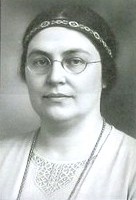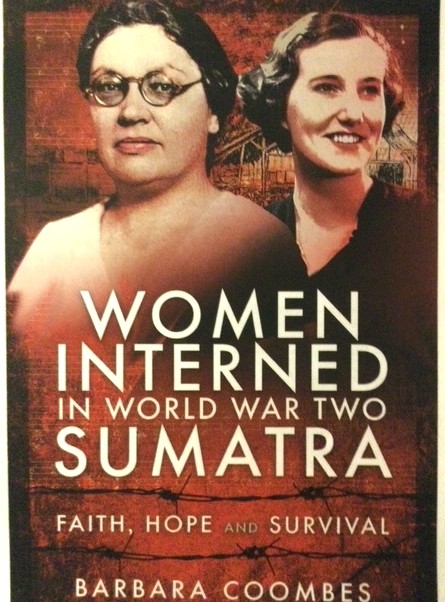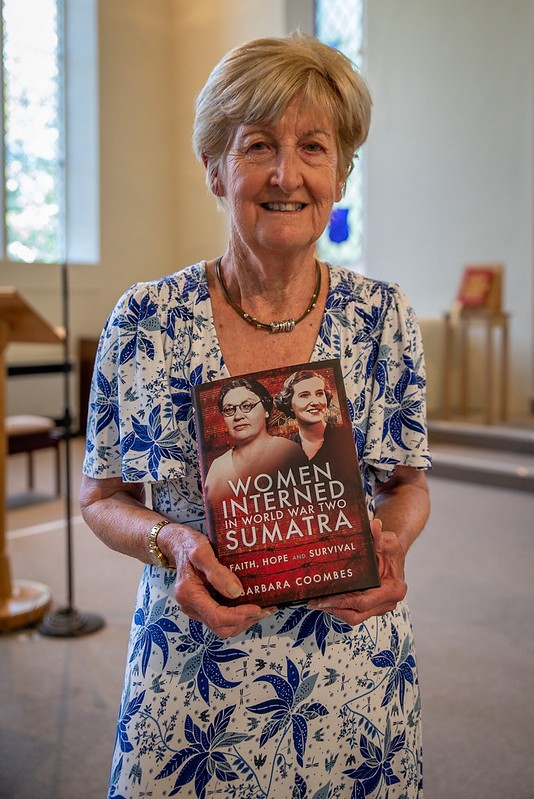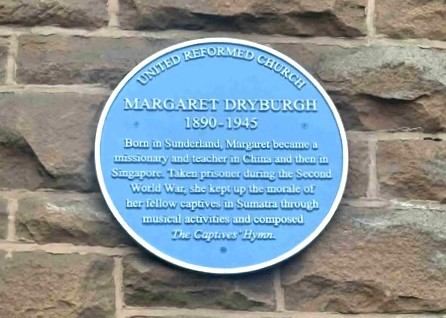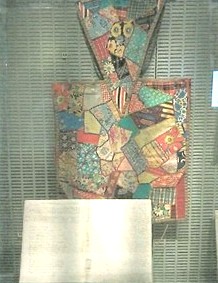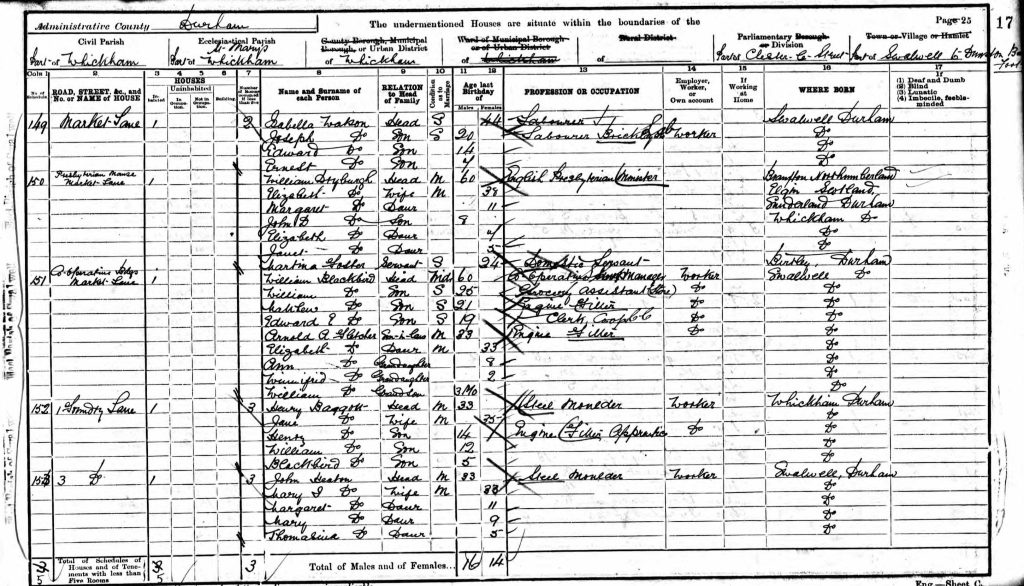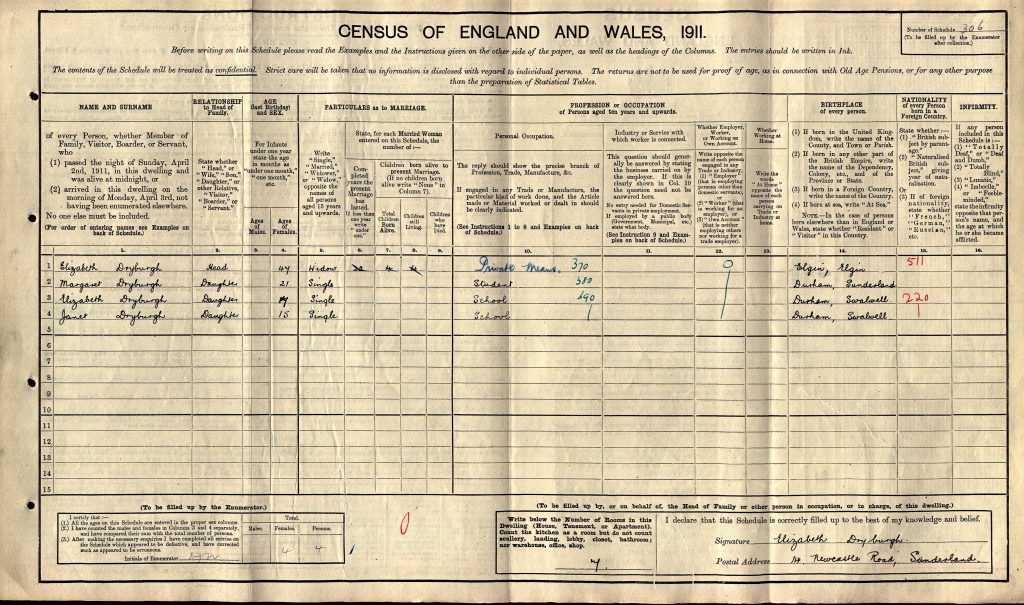Margaret Dryburgh, B. A., was born on 21 February, 1890, at 26 Mason Street, Sunderland; the daughter of the Rev. William and Elizabeth (Webber) Dryburgh.
She was a Presbyterian Missionary Teacher – formerly in China. Margaret was also a trained nurse. She was appointed the Headmistress of the Choon Guan School, Singapore & organist at the Presbyterian Church, Orchard Road. She lived at 11 Adam Rd, Singapore.
She was evacuated from Singapore aboard the Mata Hari. She managed to survive internment right up to the very end but died in captivity on 23rd April 1945 aged 55, at Belalau, Lubbuk Linggau, Sumatra. After the war, her grave was moved from Palembang to the Dutch Military Cemetery, Semarang, Central Java.
Margaret arranged the Vocal Orchestra music in partnership with Norah Chambers (excepting Dvorak’s Largo which was arranged by Margaret and Ravel’s Bolero which Norah arranged ) and Norah spoke of Margaret as a ‘musical genius’.
Margaret Dryburgh formed the early choir in the women’s camp at Palembang with 3 other missionaries. She composed the music and words of The Captives Hymn, which was sung in camp every Sunday and which is sung around the world today. Margaret Dryburgh’s biography, together with that of internee Shelagh Brown, who was a member of the Vocal Orchestra, has been written by Barbara Coombes (below right) in her book Women Interned in WW2 Sumatra.
On Sunday 8th June, 2025, at the United Reformed Church in Sunderland; a Service was held to unveil the Blue Plaque dedicated to the life of Margaret Dryburgh. Attended by Stephen and Margie Caldicott, Dr. Judy Balcombe and Arlene Bennett, Judy wrote:
“We are in Edinburgh now after a wonderful day in Sunderland yesterday. The church service to dedicate the plaque to Miss Dryburgh was very beautiful and many people attended from surrounding parishes. There were very special readings and prayers and it couldn’t have been done in any better way. There were lovely tropical flowers in the church.”
Margaret Dryburgh conducted church services each Sunday in the garage in Irenelaan houses camp in Palembang, wrote poems and plays and drew many sketches of the squalid living conditions. She helped to raise morale in camp, including through the Vocal Orchestra and was regarded as a Saint by her fellow prisoners. She would also find flowers for the birthday parties of other internees.
The Australian film Paradise Road which can be downloaded tells the story of the Vocal Orchestra and its 2 co-founders. A concert by the choir of St Paul’s Church, Chichester featuring the original Vocal Orchestra music and attended by former Internees and their families was held in 2013. The concert was narrated by Tenko actresses Louise Jamieson and Stephanie Cole and was recorded by Tenko creator Lavinia Warner for research purposes. Funds from this concert were sent to Muntok on Bangka Island to assist the school at Kampong Menjelang, the site of the former Women’s Prison Camp and also helped to fund a memorial plaque in memory of the prisoners who died in Muntok and who remain buried there under houses and a petrol station and in a group grave.
Below, an apron made by internee Mrs. Mary Brown from scraps cut from the women’s dresses, with the words and music of her Captives’ Hymn, as a birthday gift for Miss Dryburgh. The apron is now in The Imperial War Museum North.
Since 2017, an annual memorial service has been held on the beach at Muntok each February 16 and is attended by families’ of the Australian Army Nurses and civilian internees, local Indonesian authorities and friends and the Australian, British and New Zealand Embassies. The words of The Captives Hymn are spoken during the service. The service ends with the Walk for Humanity, where all present hold hands and walk into the water as the Nurses did before they were shot, hoping and praying for a less violent world.
For people wanting to know more about the Vocal Orchestra music and the prison camps of Muntok, Palembang and Belalau, this was written about by Dutch internee Helen Colijn in her book Song of Survival. Australian historian Lynette Silver wrote Angels of Mercy, after interviewing Australian Army Nurse Pat Gunther. Australian Professor Christina Twomey has a strong interest in civilian internees and has written Australia’s Forgotten Prisoners. The Muntok Peace Museum has a bilingual exhibit about the Palembang Women’s Prison Camp Vocal Orchestra, prepared by Australian Diane Whitehead who is writing the biography of Norah Chambers.
Some earlier records for Margaret include:
1901 England Census:
1911 England Census
Margaret’s Probate Record:
The Choon Guan School
After 1934, when Margaret Dryburgh was appointed Principal of Choon Guan, educational standards were raised and so in 1936 the English section became a separate school called Choon Guan English School. In 1938, it became a ‘grant-in-aid’ for boys and Mr J R Richardson became the principal. As a result, the same year, a school for girls, called Kuo Chuan Girls’ School, was opened at 36 Joo Chiat Lane with Miss Margaret Dryburgh as principal. It had one hundred girls and three teachers. During the Japanese Occupation, the school was bombed and remained closed for the duration of the war while the boys’ school became a Japanese school named Koon Seng Road School. Nineteen days after the end of the Japanese Occupation, on 24th September 1945, the boys’ school reopened, once again with Mr Richardson as Principal. The girls’ school did not open until the next year and Miss Monica Sirkett arrived from England in 1947 as Principal.
